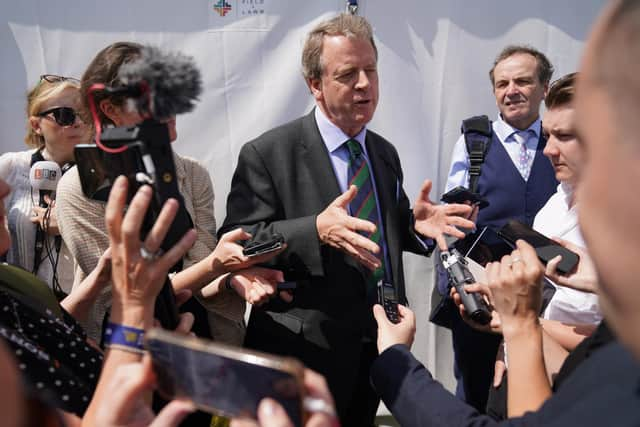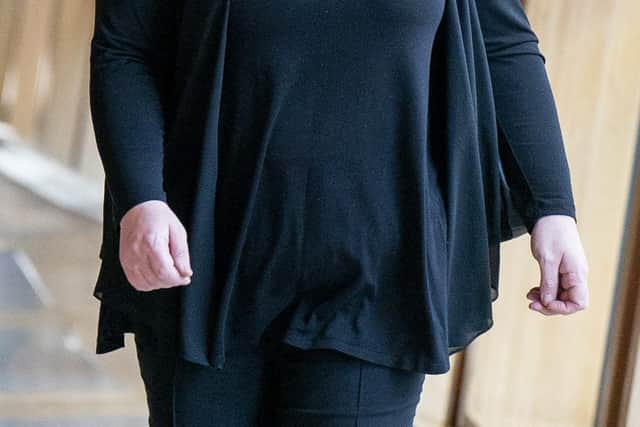Exclusive:Alister Jack claims Scottish Government 'manufacture grievances' and passionately defends Boris Johnson's legacy
Alister Jack has accused the Scottish Government of bringing legislation purely to “manufacture grievances” in a fierce response to calls for the decriminalisation of all drugs for personal use.
Speaking exclusively to The Scotsman, the Scottish secretary claimed the policy was more about picking a “constitutional battle” than helping people, pointing to Scotland’s death rate from drugs being four times higher than in England.
Advertisement
Hide AdAdvertisement
Hide AdMr Jack also mocked SNP Westminster leader Stephen Flynn for calling him an “easy opponent”, as well as detailing why he was such a strong supporter of former prime minister Boris Johnson.


The senior minister expressed his frustration at needing to block Scottish legislation, having made a series of interventions over the deposit return scheme (DRS), the Gender Recognition Reform Act, and now potentially on drug policy.
He said: “I think there’s an element of the Scottish Government bringing forward legislation to try and manufacture grievances with the UK Government. I would prefer they focused on the day-to-day governing that devolution was set up to facilitate – health, education, crime, those things, ferry services to the islanders.
“We’ve seen the deposit return scheme, the Gender Recognition Act. We’ve also had this request to devolve more powers over drugs, but the same drug laws exist in the United Kingdom.”
Scottish drugs minister Elena Whitham announced the plans on Friday, which would require the backing of the UK Government, along with a framework for the creation of safe consumption rooms and the consideration of implementing the regulated supply of drugs.


However, Mr Jack, who will stand down at the next general election, claimed the Scottish Government were not using the tools they already had.
He said: “The Scottish Government have already more or less said to the police ‘don’t lift people for possession’, and that hasn’t been the case in England where deaths have been way lower.
“I still think the right approach is to take the health solution, rather than to decriminalise them [drugs]. The Scottish Government has already tried a soft approach and it hasn’t helped the statistics anyway. It feels to me like a constitutional battle. They have the same tools that exist in the other administrations, I just think they need to start using the tools.”
Advertisement
Hide AdAdvertisement
Hide AdMr Jack stressed he was willing to work with the Scottish Government on tackling drug deaths, adding: “We would like them to come back and ask for our help to address this. We did make the offer when Kit Malthouse was the policing minister.”


A former businessman, Mr Jack claimed support for the SNP was falling, saying people were “disillusioned” with that had happened surrounding controversial policies, a police probe into the party’s finances and the departure of Nicola Sturgeon.
He said: “If you go back to November last year, we had the judgement in the UK Supreme Court, which absolutely vindicated our position that the constitution is a reserved matter, and the UK Government was successful in that case.
“It wasn’t a case we brought, it was a case brought by Nicola Sturgeon, and the SNP were invited to join in, as were the Scottish Government. But the judgement was absolutely clear – not only is the constitution a reserved matter, but as I recall, Scotland is not an oppressed colony.
"It was a strange thing to claim, and the judges were very clear, all that kind of hyperbole is very wrong. I think that caused problems within the SNP. I think a number of the electorate realised it was not as straightforward as just having a referendum as they thought, that was a bit of a wake-up call. I think some became disillusioned with it, and others disillusioned with the party.
“On the back of that of course we had the Gender Recognition Reform Act, and they were just flying in the face of public opinion with what they were proposing on that.
“I did a section 35 order, I did that in January. In February, Nicola Sturgeon resigned, and since then the Scottish National Party have had their difficulties with arrests and other things.”
Mr Jack also claimed support for independence was falling, pointing to a YouGov poll published this week, in which 37 per cent said they would back separation, down from 39 per cent, compared to an increase to 46 per cent for No.
Advertisement
Hide AdAdvertisement
Hide AdAsked if the union was stronger than before he took office, Mr Jack said: “Yes. The United Kingdom is much stronger now, and the numbers for independence that we are seeing, based on the opinion poll that we saw [on Monday] and general trends, the desire for breaking up the United Kingdom has diminished somewhat.
“I think the United Kingdom is getting stronger and stronger.”
The Dumfries and Galloway MP described Humza Yousaf as a “very different person” to Ms Sturgeon, and suggested the SNP were having issues due to the coalition with the Greens.
He said: “Since then, I’ve been slightly baffled with some of the decisions they have taken. I suspect the DRS debacle, I’m pretty sure that was driven by the Greens. Gender, I suspect, was pressed by the Greens, and I don’t think the Greens are doing this Scottish Government any favours, or the people of Scotland any favours.”
There were also harsh words for the leader of the SNP Westminster group, who when asked by The Scotsman to come up with something nice to say about Mr Jack, suggested he was a “nice opponent”.
Pointing to the UK successfully blocking a series of Scottish Government policies, Mr Jack said: “Flynn may say I’m an easy opponent, but who is winning?”
There were also kind words for Mr Johnson. A close ally, Mr Jack did not vote for the sanctions recommended by the Privileges Committee and has questioned the body’s findings.
Asked why he supported Mr Johnson and about the former Tory leader’s legacy, Mr Jack pointed to actions taken in Scotland and in getting “the big calls” right.
Advertisement
Hide AdAdvertisement
Hide Ad"If I take Boris and what he did for Scotland, I found everything I asked for, including structural funding and the spending powers in the UK Internal Market Act, and protecting Scottish business through the Internal Market Act … I got total support from Boris on that.
"In terms of his legacy … like it or not, he got Brexit done, because it was pulling this country apart at the time.
“He then got stuck in on Covid, and was totally focused on backing five vaccine companies, and I think he said the ‘vaccine is cavalry coming over the hill to save us, and it’s all about the vaccine’. He was relentless in pursuing that, and then getting the vaccine into people’s arms quickly.
“Then Ukraine came along. Germany, France and Italy were reliant on Russia for oil and gas, but Boris recognised that someone had to stand up to [Russian president Vladimir] Putin, and get the arms and the money to [Ukrainian president Volodymyr] Zelensky as quickly as possible. He went hammer and tongs on that.
“That response was critical because if Putin had been allowed to walk across Ukraine, where would it have stopped? Who would have been next? When it came to those big calls, he got those big calls right, and he was dogged and determined in his focus. And that to me is his legacy.”
There was also praise for the new UK investment zones announced last month, which the UK Government have said are intended to grow the economy in Scotland. Located around Aberdeen and Glasgow, the zones involve working with the Scottish Government, but are fully funded by Westminster.
Mr Jack said: “They will have similar tax status to free ports, very much innovation focused, bringing high-wage, high-skilled jobs and we’re very excited about them.
"This direct structural funding we are doing it is through the UK Internal Market Act. We have the ability in the UK Government to be in the place of the EU, and make direct funding into local authorities for special projects that local people have identified is what they need, and we haven’t been able to do that for 40 years.”
Advertisement
Hide AdAdvertisement
Hide AdA spokesperson for the First Minister dismissed Mr Jack’s comments, claiming Mr Yousaf was already delivering for Scotland.
The spokesperson said: “Alister Jack is mistaken, and he would do well to talk with the Scottish Government, rather than high-handedly vetoing measures supported by MSPs across different parties. On drugs policy, which he mentions, the UK Government rejected what are well-evidenced proposals – that are mainstream internationally – without even the courtesy of giving them proper consideration.
“An underlying problem is that the UK’s post-Brexit arrangements, particularly the Internal Market Act, threaten to impose uniformity and integration, when the whole point of devolution is to enable difference and diversity. [Former Scottish secretary] David Mundell used to talk about Holyrood being ‘one of the most powerful devolved parliaments in the world’, yet Mr Jack can now prevent MSPs even including glass in a recycling scheme.
“Despite these growing constraints on Holyrood, Humza Yousaf’s new Scottish Government has delivered substantial measures in its first 100 days.
“His first action as First Minister was to triple the funding to help households most vulnerable to fuel poverty, and more than 300,000 families are benefiting from our game-changing Scottish Child Payment, which is unique in the UK.
“We have launched a new ten-year cancer strategy to improve survival rates, and are making progress in cutting NHS waiting lists.
“Just last week, the First Minister announced the biggest pay uplift since devolution for senior medical and dental staff, and Scotland continues to be the only nation in the UK that has avoided NHS strikes over the last year.
“Work to reset relationships with business and local government is well underway, as well as rebuilding and reshaping how education is delivered.”
Comments
Want to join the conversation? Please or to comment on this article.
